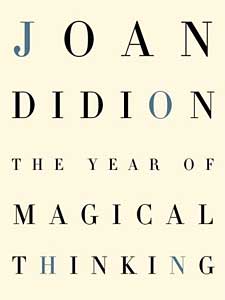Photos
Resources
| |||||||||||||||||||
 |
| Joan Didion's latest book, "The Year of Magical Thinking," recounts how she coped with the sudden death of her husband and her daughter's serious illness in 2004. (Image courtesy of Knopf) |
St. Paul, Minn. — Turn Joan Didion's spare, elegant memoir over and you'll find a black and white photograph on the back cover. It's Didion in 1976, elbows propped on a deck railing, the Pacific ocean stretching out behind her. She's holding a cigarette and wearing a wistful expression, not looking at the camera.
The other two people in this family portrait are. John Gregory Dunne clasps a glass in one hand and leans close to their daughter, Quintana Roo, as they regard the photographer with level, almost challenging gazes. You study the picture, imagining Malibu where it was taken n the mid-'70s. Then your eye skips down to the words written below the photo.
"Life changes fast. Life changes in the instant. You sit down to dinner and life as you know it ends."
That's how Joan Didion opens her memoir. The words appear again and again, their meaning changing, growing weightier as you go deeper into the story of what she calls her "year of magical thinking."
It was a year in which she grieved for the sudden loss of her husband and lived with the near-constant uncertainty of her daughter's critical illness.
Los Angeles Times literary writer Anne-Marie O'Connor spent the day with Didion recently in her New York apartment, and says the power and the poetry that Didion brought to the subject of grief and loss is extraordinary.
"Grief is something people experience privately very often, and grief literature is written often by psychologists and professionals. And a lot of it isn't very adequate in many ways," says O'Connor. "But this is a situation where one of the best writers living in the world today has chosen to focus on her own personal grief over her husband and her daughter. And that makes this book quite unusual, because it's beautifully written but it's also deeply personal."
|
I know that if we are to live ourselves, there comes a point at which we must relinquish the dead, let them go, keep them dead.
- Joan Didion, in "The Year of Magical Thinking"
|
Didion's work has always been personal. She once said of herself, "I write entirely to find out what I'm thinking, what I'm looking at, what I see and what it means. What I want and what I fear."
Critics have often been divided over what they see as Didion's self-involvement. Atlantic Monthly literary critic editor Benjamin Schwarz, who has reviewed several of Didion's works, says he's often been bothered by what he calls a "self-important ennui" -- the careful attention she pays to her own image.
"(Which is) very carefully and deliberately cultivated, so people who actually like that image like reading about it. But for the rest of us, it can get on our nerves," says Schwartz.
Schwartz lauds Didion for her essays in collections like "Slouching Towards Bethlehem" and "The White Album." But he parts company with much of her political writing, which he calls narrow and "unimaginative."
Karen Grigsby Bates, a commentator for NPR's Day to Day program, says the personal lens through which Didion has always written is what makes the author, in Bates' opinion, one of the most interesting writers today.
"It's like thinking out loud, only we're privy to it. And eventually it gets put between covers, and goes out for everybody to make their decision as to what they think about it one way or the other," says Bates. "But I think that she probably is, first and foremost, writing for herself. And her mission, I think, is to write as honestly and as unflinchingly as she can, and I think that's probably why we got the book we got in 'The Year of Magical Thinking.'"
Indeed, the book is unflinching -- right from its opening pages, in which Didion describes in vivid detail the night John Gregory Dunne died in December 2003.
The couple had been to the hospital to visit their daughter in intensive care, and suffering from an infection that confounded her doctors.
When they got home, Didion writes, she built a fire, made a drink for her husband and started dinner.
"I remember looking up. His left hand was raised and he was slumped motionless. At first I thought he was making a failed joke, an attempt to make the difficulty of the day seem manageable. I remember saying, 'don't do that,'" Didion writes.
In the months after Dunne's death, Didion coped by turning her reporter's eye on the sequence of events -- the paramedic's report, the autopsy, the medical details of her husband's previous cardiac treatment.
She also writes of her daughter's relapse, the experimental drugs they turn to, and the signs that recovery is growing increasingly unlikely.
The most poignant passages are her description of what she calls "magical thinking" -- an inability to read her husband's obituary; a reluctance to give away his shoes, sure that he'd need them some day when he came back. Los Angeles Times writer O'Connor says that's what made Didion's description of her grief and slow acceptance so convincing.
"Death is cumulative. The event happens right away, just like a marriage. But the acceptance of it and having the event become a reality is cumulative," says O'Connor. "It takes little reminders and little things to make it real. And a lot of the book deals with those things that allow her to come to terms with it, accept it, and finally start letting it go."
Yet, this memoir ranges far from her year of grief. She gives us vignettes from the couple's years in California, where she and Dunne each wrote novels, but also collaborated on motion-picture screenplays.
She writes of afternoons reading and writing, punctuated by dips in the pool. She tells us of making souffles with actress Katherine Ross and living at the beach at Malibu. Didion has always worn her Western heritage proudly, and once said that she never really felt like a writer until she left New York and moved back to her beloved California. But for now Didion remains in New York, in the apartment that she shared with her husband, in the midst of the demands of a book tour.
Atlantic Monthly critic Schwarz says he's surprised that Didion wrote the book so soon. He says he wonders what it might've been like had she put some distance between the wrenching events of last year and the writing.
"I'm sure emotionally it was cathartic for her to have written it now, and I do admire a great many things about her writing," says Schwartz. "When she's observing, there's a coolness and detachment that the reader senses and that allows her to approach very complex and fraught subjects with surgical precision, and it's what I would eventually want from her."
Didion finished the book in December 2004, and with what seemed like growing acceptance, she wrote, "I know that if we are to live ourselves, there comes a point at which we must relinquish the dead, let them go, keep them dead."
But what Joan Didion didn't know, as she wrote those words last winter, was that more grieving lay ahead. Her daughter Quintana Dunne Michael died on Aug. 26, 2005.





